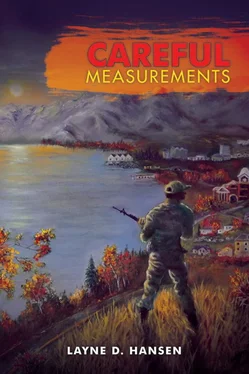“What’s so funny?” she asked, the strain now replaced with a twinkle in her eye.
“Oh,” he said with his gap-toothed grin, “I imagine we’re probably the first black folks to ever live in this part of the country.”
She smiled at that. Her husband was likely correct. She’d read the history of the area they were moving to. She couldn’t imagine that many African Americans had set foot in the Pocatello Valley.
Shontae was fifty-two. Frank, whose full name was Chevelle Franklin Norton, was fifty-six. He had just retired as a partner in a large accounting firm in San Francisco. His career afforded her the opportunity to stay home with their children and pursue her hobbies of gardening and, most recently, painting.
He broke out of his daze and looked at her again. She was beautiful and so radiant when she was happy and not in pain. In some ways her ovarian cancer had been the best thing for their marriage. It had calmed her, helped her lose unwanted weight, and humbled her—all of which she now agreed had been necessary.
“You look tired, Baby,” he said, concerned.
She leaned back, giving him an imperious look. But the gaze was playful and she was glad at his concern. “I am,” she said quietly, “but I like being here, out of that damned bed of ours..”
He grinned slightly and ate a spoonful of soup. She reached her hands out and he grabbed them. Their eyes met and they shared one of those gazes that only long-married couples could share. Their years of experience, both the good times and the bad times, passed between them through an invisible, emotional conduit.
Their server arrived with their dinner plates, warned them of their temperature, refilled their water glasses, and left with a smile. They sat and ate in silence. Not an awkward silence, but one of exhaustion and a sense of relief to finally be on their journey. It had been a difficult decision for them to enter this experiment. Their youngest child had just graduated from high school and was about to enter college. Two of their children were married and had young children. Her cancer had finally gone into remission and Frank was about to retire. They had finally attained all that they had worked for, but something had beckoned them away.
Perhaps they began to think that they could only find peace in new surroundings, around new people, and in a new profession. For work, Frank had chosen to enter into a corporation that would manufacture food products. His part in the enterprise was to operate a canning and bottling plant, processing the food that the other partners would raise and grow.
At Frank’s insistence, Shontae wouldn’t work. Frank had always made a lot of money. However, his ban on her working would allow her to focus on her hobbies and allow her to heal. Although Frank had always been a workaholic—in fact his dedication to his job and not to his family had been a major sore spot in their marriage—he promised her that he would work long enough to make their business a success. Then they could spend time together.
“Nervous?” she asked, knowing that he wasn’t.
He took a deep breath and then let it out slowly. “Anxious, more like.” He looked away for a moment. “The break will be good, though.”
She had to laugh at that. A break for him was to work only sixty hours per week.
“What about you?” he asked, concern returning to his eyes.
“It will be nice to get away from it all,” she replied with a smile. Her face suddenly went stern while making a jabbing motion with her fork. “You better keep your promise, Frank, and not just for me, either. This is a new life and I think we should have a new way of doing things.”
His first impulse at this type of talk used to be a flare of anger and then let her talk him down. But he had changed, too. He no longer felt that incessant clock in his head—the constant need to get on with the next task.
“At first I’ll have to work hard to get things running, but I plan on finding a good assistant and letting them run the show.”
She thought about that for a minute. The man had changed so much in such a short time. Better yet, he had made the changes for her and their marriage. They smiled at each other again. She suddenly felt the presence of someone standing above them. They looked up and saw a man. He was younger than Frank and had a blond woman in tow.
“Aren’t you Frank Norton?” the man asked, grinning broadly.
Frank wiped his hands on his napkin.
“Yes I am,” he replied, confused.
“I’m Patton Larsen. I’m running the farm and greenhouse.”
“Oh… Patton!” Frank barked. He stood and offered his hand. The two had found each other on the microcosm.org site and had decided to work as partners with their two separate enterprises. “So nice to finally meet you!”
“You too.” Patton patted Frank’s right shoulder with his free hand and repeated, “you too.”
“Oh,” Frank said, embarrassed, “this is my wife Shontae.”
Patton turned to her and smiled. They shook hands briefly. The two had spent hours chatting online. “Yes I remember. How are you?”
“Great, Patton.” She released his hand and placed her hand on her husband’s broad shoulder.
“Great, great,” Patton said, grinning broadly. He motioned towards Jennifer who walked over from their table. “Jennifer, this is Frank, the guy I was telling you about, and his wife Shontae.”
There were smiles and handshakes all around. Shontae invited them to join them for dessert and they accepted. Jennifer and Shontae had their own conversation while Frank and Patton discussed business. Their conversations went on for a long time and stopped only when the train started to slow.
“Must be coming up on Elko,” Frank said. “Are you two getting off the train?”
They looked at each other and smiled, embarrassed for some reason.
“We weren’t planning on it,” Jennifer replied.
Frank stood, followed by Shontae.
“Well, we were going to get off and get some air. Would you two like to join us?”
Patton and Jennifer looked at each other. “We’d love to,” Patton said, standing. He helped Jennifer to her feet and the four waited for the train to come to a complete stop.
The doors slid open and they were met by a wall of crisp air.
“Well, what should we do?” Frank asked everyone.
Patton shrugged and said, “It’s Elko. We can do whatever we want.” He stepped off onto the platform and the rest followed him, laughing loudly.
Charlie Henry grimaced at the view. Patches of crusty snow stood out like islands in the wide expanse of the drab, lifeless landscape. Although he’d never been in this part of the country he hated it, and for some reason he’d always hated it. His train had originated in Chicago. Now that was a city, Charlie thought. This… this flyover country… looked like it’d been nuked. There weren’t many things in the world, particularly in America, that he didn’t hate.
He was born Charles Harrell Jr., but changed his name when he was nineteen and did so for two reasons. First, he was wanted by police for assaulting a Chicago police officer during the 1968 Democratic National Convention. The second, and more important reason, was that his father’s name was also Charles Harrell. He hated his father. Charlie’s father wasn’t a bad man—quite the contrary. He was a good and kind man. What Charlie despised about his father was his seeming lack of passion. He’d been content with his quiet, boring, workaday life—satisfied with the little job, with his little house, and his little family.
Charlie Henry had never been an introspective person, or one willing to accept criticism, no matter how constructive. He had been a sheltered and pampered child, brought up by two parents who had lived through the worst of the Depression and the Second World War. Despite his parents’ sacrifices, they had never passed their hard-learned lessons onto their son. Young Charlie had always had an unquenchable desire for adventure—to be a part of something big or something important. It was that desire that caused the irreparable rift between them.
Читать дальше












